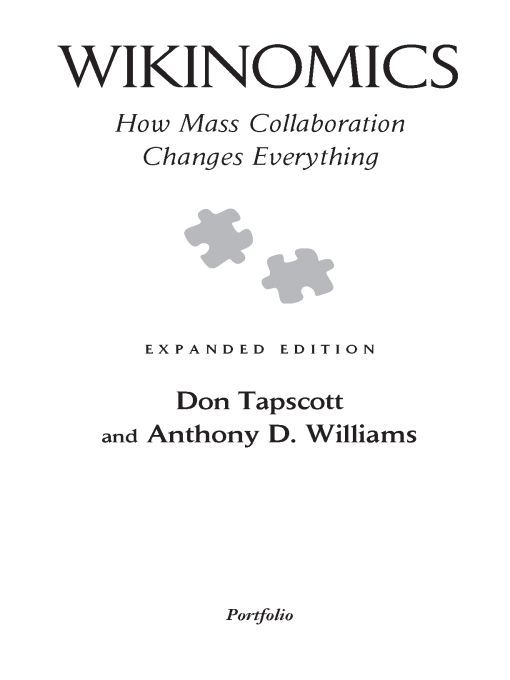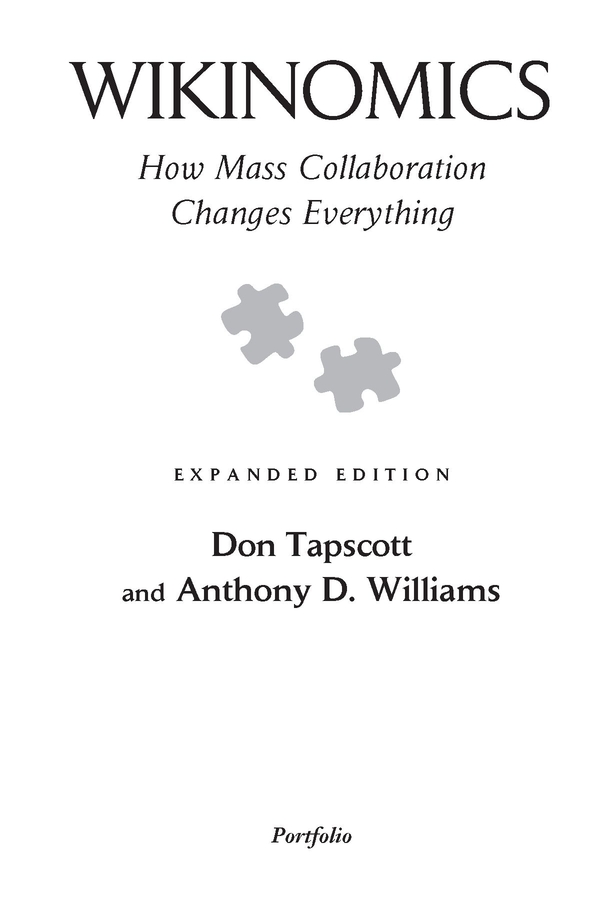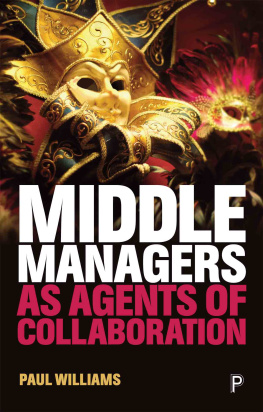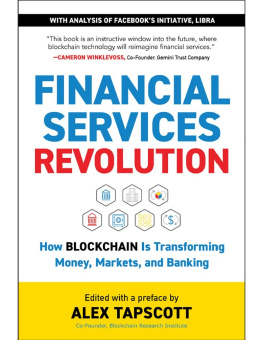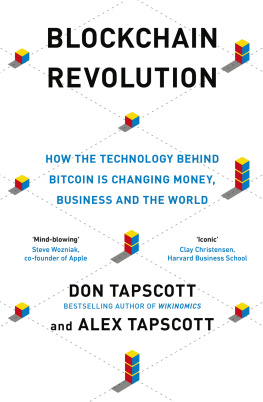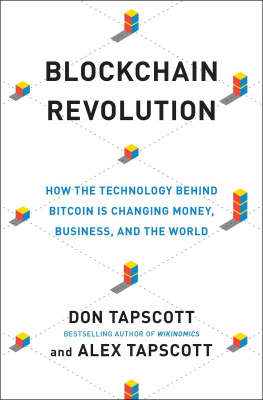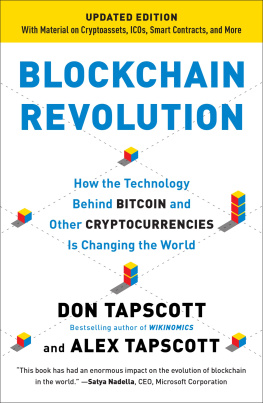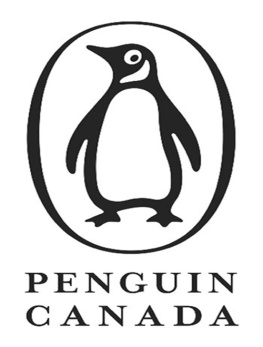Table of Contents
Praise forWikinomics
Wikinomics illuminates the truth we are seeing in markets around the globe: the more you share, the more you win. Wikinomics sheds light on the many faces of business collaboration and presents a powerful new strategy for business leaders in a world where customers, employees, and low-cost producers are seizing control.
Brian Fetherstonhaugh, chairman and CEO, OgilvyOne Worldwide
"A MapQuest-like guide to the emerging business-to-consumer relationship. This book should be invaluable to any managerhelping us chart our way in an increasingly digital world.
Tony Scott, senior vice president and chief information officer, The Walt Disney Company
Knowledge creation happens in social networks where people learn and teach each other. Wikinomics shows where this phenomenon is headed when turbocharged to engage the ideas and energy of customers, suppliers, and producers in mass collaboration. Its a must-read for those who want a map of where the world is headed.
Noel Tichy, professor, University of Michigan and author of Cycle of Leadership
A deeply profound and hopeful book. Wikinomics provides compelling evidence that the emerging creative commons can be a boon, not a threat to business. Every CEO should read this book and heed its wise counsel if they want to succeed in the emerging global economy.
Klaus Schwab, founder and executive chairman, World Economic Forum
Business executives who want to be able to stay competitive in the future should read this compelling and excellently written book.
Tiffany Olson, president and CEO, Roche Diagnostics Corporation, North America
One of the most profound shifts transforming business and society in the early twenty-first century is the rapid emergence of open, collaborative innovation models. Wikinomics captures these shifts and explains them in a way that demands the immediate attention of every business, academic and government leader who is interested in driving change.
Nick Donofrio, EVP of Innovation and Technology, IBM Corporation
After the crash of the dot-coms many business leaders breathed a sigh of relief that their traditional business model was safe. Wikinomics shows how such complacency is folly. Fueled by the global adoption of the Internet, which has enabled new forms of collaboration and spawned new types of communities, we are entering a second bigger wave of the Internet age. What an insightful analysis of the business upheaval we are facing!
Steven L. Sheinheit, EVP and chief information officer, MetLife
Wikinomics highlights a sea change in business today. Customers have more knowledge and power, corporate boundaries are becoming more porous, and people can now collaborate on a scale previously unthinkable. Wikinomics will help you understand the changes, why they should be good news for businesses, and how to win in this new world.
Gordon Nixon, chief executive officer, Royal Bank of Canada
I love this book. How counterintuitive that openness, peering, sharing, and acting globally would become key to corporate competitiveness, growth and profit. Mass collaboration is the most disruptive development in business in a long time. Consider Wikinomics your survival kit.
Ross Mayfield, CEO, Socialtext
An extraordinary book. Forward thinking leaders need to understand what this book offers. It was highly meaningful learning for me.
Michael H. McCain, CEO, Maple Leaf Foods
Tapscott and Williams have found a way to help companies gain efficiencies by revealing a unique blend of peer interaction, creative modeling and collaboration, or as they call itwikinomics.
Ann M. Purr, FLMI, CSP, PCS, second vice president of information management, LOMA
We dedicate this book to our children, Alex and Niki Tapscott
and Immanuel Williams. We hope that it helps our generation open up
the economy to yours.
PREFACE
At the end of 2006, the same week Wikinomics was first published, Time magazine chose "YOU, the online collaborator, as its "Person of the Year. Time was right to highlight the explosion of social networking. MySpace was growing at two million new registrants per week (and with over two hundred million members was on its way to half a billion). Most college students in the United States were on Facebook. A new blog was created every second of the day, twenty-four hours a day. It seemed that You really was changing the world.
At the time we were thrilled to launch our book at such an auspicious moment in history. But looking back on it, it was so 2006!
As we explained in Wikinomics, the Internet is no longer about hooking up online, creating a gardening community, or putting a video on YouTube. User-generated media and social networking are really just the tip of an iceberg. A new mode of production is in the making.
Thanks to Web 2.0, companies are beginning to conceive, design, develop, and distribute products and services in profoundly new ways. The old notion that you have to attract, develop, and retain the best and brightest inside your corporate boundaries is becoming null. With the costs of collaboration falling precipitously, companies can increasingly source ideas, innovations, and uniquely qualified minds from a vast global pool of talent.
The evidence continues to mount in support of our assertion that the corporation may be going through the biggest change in its short history.
Indeed, the impact of Wikinomics has been quite remarkable. The concept itself has become a word in the vernacular. The word wikinomics (small w) is being used in ways and by groups that we never anticipated. Everyone from urban planners to fundamentalist Christians are discussing the concept. There is even a Wikinomics for Obama group on
The movement to stop global warming is a good example of mass collaboration in action. Were in the early days of something unprecedented: Thanks to Web 2.0 the entire world is beginning to collaborate around a single idea for the first time everchanging the weather. Climate change is quickly becoming a nonpartisan issue, and all citizens obviously have a stake in the outcome. So for the first time we have one global, multimedia, affordable, many-to-many communications system, and one issue on which there is growing consensus. Around the world there are hundreds, probably thousands, of collaborations occurring in which everyone from scientists to schoolchildren are mobilizing to do something about carbon emissions. The killer application for mass collaboration may turn out to be saving the planet, literally.
Predictably, however, new paradigms bring dislocation and confusion. They are often received with coolness, or worsemockery or hostility. Vested interests fight against the shift. Leaders of the old have great difficulty embracing the new.
Wikinomics has certainly had its detractors.
For example, Nicholas Carr, a former editor of the Harvard Business Review , wrote an article entitled The Ignorance of Crowds, in which he criticized us and others for promoting the power of mass collaboration. Carr argues that peer production is best viewed as a means for refining the old rather than inventing the new; that its an optimization model more than an invention model. He concludes that only a relatively small and formally organized group of talented professionals can produce breakthroughs.

